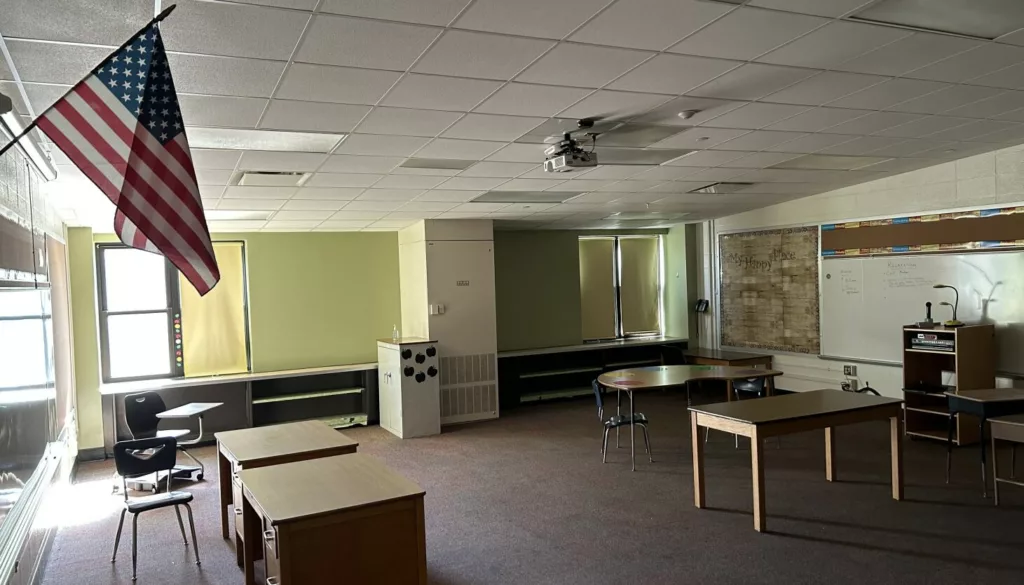[ad_1]
A bill in the Indiana Senate would appreciably increase a state regulation that requires faculty districts to make their vacant properties out there to constitution universities.
While existing state regulation compels districts to make vacant or unused structures obtainable to market or lease to charter faculties for $1, Senate Bill 391 would make clear that the regulation also applies to an “underutilized” making.
It would call for districts to compile an yearly report of the structures it works by using for instruction to figure out if any are underused, which the invoice would determine as occupied at less than 60% capacity. Underutilized structures would be shut, and constitution schools would be notified, unless of course the district could show it takes advantage of a creating for other capable purposes.
The proposal would also permit charter educational facilities or the point out Division of Education and learning to request a evaluation at any time of whether or not a college building ought to be shut. And districts that really don’t comply with the law would be issue to a funding penalty, losing 3% of their condition tuition support for 12 months.
Monthly bill creator Sen. Linda Rogers (R-Granger) stated the intent of the monthly bill was to offer more clarity to the present rules that govern college constructing closures.
The condition has a short while ago seen several substantial-profile circumstances of charter faculties accusing public university districts of unfairly keeping on to properties that they say should be supplied below the $1 regulation. In one illustration, a choose dominated past thirty day period that Carmel Clay Educational institutions in Hamilton County did not violate the regulation by closing an elementary school and refusing to present it to the Hillsdale Higher education-supported Valor Classical Academy. The judge cited the “ambiguity” of existing regulation.
“Taxpayers paid out for that creating to be utilized for public instruction,” Rogers mentioned. “All far too usually, properties are getting stored open up to use for storage or places of work, when there are considerably less expensive possibilities readily available.”
The monthly bill applies only to districts the place enrollment has dropped by at minimum 10% about five years and in which there is yet another suitable making serving the very same grades positioned in 20 minutes of the focused developing.
It gives exceptions for structures staying utilised for option programs, storage, or business area, but districts have to satisfy specified demands, like applying at the very least half of the building for storage and checking out other probably significantly less pricey solutions that would provide the intent.
The monthly bill would transform authority above creating closures — which at present rests with the Attorney General’s office environment — to the Department of Instruction.
If passed, the bill most likely would right away have an impact on districts like Indianapolis General public Faculties, which is in the midst of a system to restructure its use of underutilized buildings. A district facility condition report located that the district’s common utilization amount is 60%, with some educational facilities operating much beneath capacity.
The monthly bill read mixed public testimony at the Senate Education and learning and Vocation Improvement Committee Wednesday, serving as a proxy in the extended-standing fight concerning constitution and common general public school advocates.
Many speakers claimed the expansion of the legislation would effects a area faculty board’s authority to choose what to do with its structures. 1 district asked for an modification that would exempt districts if a school developing is staying used for a nonprofit educational method, like a Boys & Ladies Club.
Jerrell Blakely of the Indiana Point out Lecturers Affiliation objected to a provision that would enable constitution universities to ask for testimonials of university properties.
“There is very little to discourage an fascinated occasion from tying up the college board for months in lousy faith,” Blakely stated. “There are no penalties for striving to acquire a building with no benefit.”
But charter supporters said charter colleges really do not have accessibility to home tax funding as classic districts do, and as a result just cannot accommodate rising fascination in their packages. The legislature also is thinking of expenditures this calendar year that would compel districts to share property tax pounds with charters.
“This funding disparity forces constitution faculties to pay for their services among other fees out of the tuition aid pounds utilized to educate their students,” stated Molly Collins of the Institute for Excellent Schooling, a nonprofit firm that advocates for constitution instruction.
Lawmakers did not vote on the proposal, but Rogers mentioned she would consider some of the testimony in generating any changes forward of next week’s hearing.
Aleksandra Appleton handles Indiana education policy and writes about K-12 schools throughout the condition. Make contact with her at [email protected].
[ad_2]
Source hyperlink
Meet Our Successful Graduates: Learn how our courses have propelled graduates into rewarding
careers. Explore their success stories here!
Discover More About Your Future: Interested in advancing your teaching career? Explore our
IPGCE, MA, and QTS courses today!

Explore Our Courses: Ready to take the next
step in your education journey? View our
comprehensive course offerings now!

